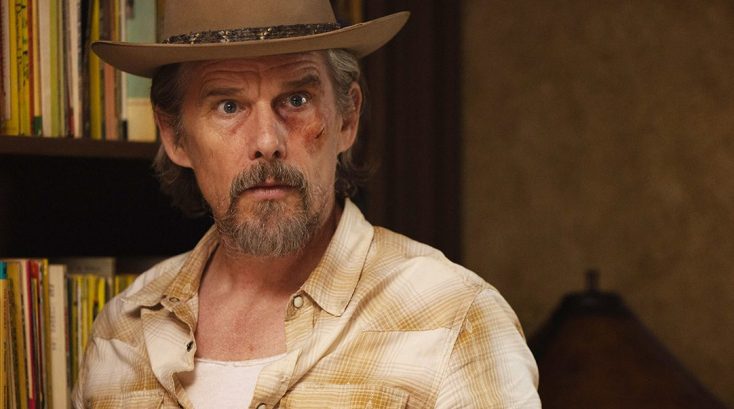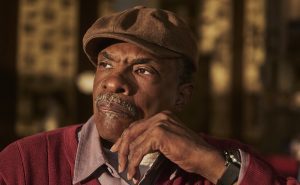By JUDY SLOANE
Front Row Features
HOLLYWOOD-Set in Tulsa, Oklahoma, FX’s new drama “The Lowdown” spotlights a self-proclaimed ‘truthstorian,’ Lee Raybon (Ethan Hawke,) a citizen journalist, whose obsession with the truth often puts him in harms way. As an idealist who is passionately committed to uncovering the city’s decay, he finds sometimes the pursuit of truth and justice interferes with seeing his ex-wife, Samantha, and daughter, Francis. Entering this gritty and quirky mix, is the mysterious Marty (Keith David,) who unexpectedly turns up in Lee’s life … but is he a friend or foe?
Creator/executive producer/writer/director Sterlin Harjo joined Ethan Hawke and Keith David to discuss their new series which premieres on Tuesday, September 23 at 9 p.m. ET/PT on FX, streaming the next day on Hulu.
Q: Sterlin, you’ve called this show Tulsa noir, which feels so specific and atmospheric. What drew you to tell this kind of story in Tulsa, and how does the city itself shape the world and the tone of the series?
Sterlin Harjo: Tulsa felt like the right place to set a noir. There’s so much political and cultural activity happening in the middle of the country and Tulsa felt like the right place. It has the right amount of grit, the right amount of history, the right amount of secrets to set this story in, and for a show that’s about someone fighting for truth, there’s a longstanding need for the truth in a place like Oklahoma. So, that’s where we find our hero.
Q: Noir stories often ask big questions about truth and morality. Did The Lowdown make you reflect on how we search for or avoid the truth in today’s world?
Sterlin Harjo: I think that “The Lowdown” is about searching for the truth when it feels it’s not reachable, and balancing your life and moving forward and still trying to grasp the truth. We need people like Lee. We need journalists, we need people on the frontlines of morality and finding what the truth is and we need people not to give up in that search for truth. The truth is a noble endeavor and that’s what this show is at its heart.
Q: Ethan, Lee is described as a self-proclaimed ‘truthstorian’ who’s always digging even when it costs him personally. How did you approach showing Lee’s obsessive side as well as his vulnerability, especially when it comes to his daughter?
Ethan Hawke: I love the expression ‘truthstorian,’ first of all, ’cause it’s not really a word. And it expresses a true thing for Lee, which is that the intersection of truth and history is so needed. That without understanding where we come from, we don’t understand where we are. But it’s also sloppy and a trainwreck of an expression, and it seemed very perfect for Lee.
I’m always drawn to people who really do want to follow their dreams. When you get hit with [being] a grownup, a lot of people compromise those things. And Lee doesn’t, but there’s a price to be paid, and that largely shows up in his relationship with his family life and with his daughter.
I think the writing of the show was wonderful because it’s such a big canvas. You get to see all of us in multiple dimensions, and the wonderful thing about television is you get this big epic canvas.
Q: Keith, Marty has this really refined, mysterious energy. He could be a friend or maybe not. How did you keep the audience guessing about his true intentions?
Keith David: You gotta play with what’s on the page and when we meet Marty, he just kind of appears and starts talking to Lee to see where he’s at. So, we don’t know, is he friend or foe? We get to discover that as we go along. As you mentioned before about his being a ‘truthstorian,’ Marty being a writer himself is interested in [Lee’s] writing and his thoughts and the way he thinks. Being asked to check him out for work leads him to someplace else—who is he really? And then who are the guys who sent him to check him out? So therein lies its own inherent mystery, which we discover as the process goes on.
Q: Ethan, what have you learned about Lee’s fight for the truth?
Ethan Hawke: I’m so grateful to be a part of a story that centers on truth and journalistic integrity. When I was a kid, when I first started in this business, every interview I did I’d get fact checked. I haven’t been fact checked in years. The idea of this story is falling at a time where I feel really grateful to be doing a press conference and really grateful to be sharing “The Lowdown” with people because the show’s full of love. It’s full of wit and humor and silliness, and it’s got an undercurrent of a really honest conversation about who we are and how we can intersect with each other and hold multiple truths at the same time.
Q: Keith, Marty shares Lee’s love of literature. How did you approach blending that intellectual side with his more mysterious motives?
Keith David: I think that his choice to become a private detective was motivated by his desire to write and find stories. And this was one of them. Lee’s manner of telling stories is inspiring to him ’cause he wants to tell those kinds of truths, or to get into that kind of creativity, that you get from taking actual truths and creating narratives that keep people interested. That was the draw.
Q: Sterlin, how important is citizen journalism today?
Sterlin Harjo: I think that’s all we have left. We have citizen journalists, and it’s up to individuals. It’s not up to corporations, it’s not up to who pays your check, it’s up to individuals that care and want to pursue the truth. I think it’s what we’ve always needed and, right now more than any time, we need that. We need people to fight for the truth.
Q: Ethan and Keith, what was your favorite part about filming in Tulsa?
Keith David: I got to meet one of the consultants, Chief Egunwale [Amusan], and got to explore Tulsa with him. And it just doesn’t get better than that, so I had a wonderful time.
Ethan Hawke: There’s such a strong sense of community in Tulsa, Oklahoma. People are really rooting for each other. People [are] making art for art’s sake, whereas when you get to New York or L.A., everybody’s making something to get somewhere else. It feels like the creativity that you’re running into is extremely authentic. The past is very present— you’re aware in the architecture and the streets and the way people talk. It has a very deep past that is representative of America as a whole. It was one of the best experiences of my life.






